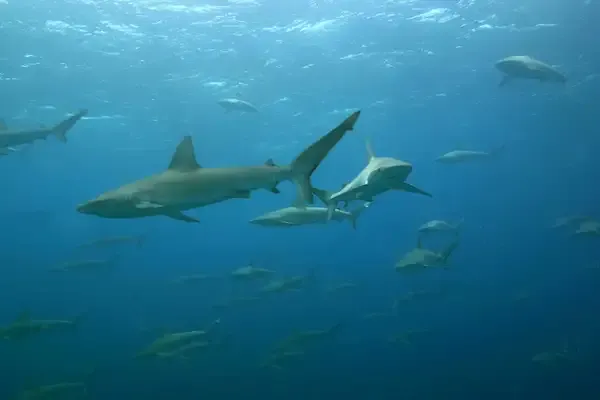- Home >
- Science
- > Innovation
Saving Sharks in the 2020s
In the 2020s, saving sharks has become a pivotal environmental focus as their populations face severe declines due to overfishing, habitat loss, and climate change. Conservation efforts include implementing stricter fishing regulations, establishing marine protected areas, and promoting sustainable seafood choices. Public awareness campaigns aim to change perceptions and reduce demand for shark products. Collaborative international efforts are crucial in safeguarding these vital apex predators, ensuring they continue to play their essential role in maintaining ocean health and biodiversity.

Sharks have long been misunderstood and vilified, often seen as ruthless predators. However, the reality is that these magnificent creatures play a vital role in maintaining the health of marine ecosystems. As we navigate through the 2020s, the urgency to save sharks has escalated due to overfishing, habitat loss, and climate change. This article will explore the various strategies and initiatives aimed at ''saving sharks'' in this decade, along with the importance of awareness and conservation efforts.
The Importance of Sharks in Marine Ecosystems
Sharks are apex predators and are crucial for the balance of marine life. They regulate the populations of prey species, which in turn helps maintain the health of the ocean. Without sharks, we could see a collapse of marine ecosystems, leading to detrimental effects on biodiversity and fish populations. Understanding the ecological role of sharks is essential for promoting their conservation.
Current Threats to Shark Populations
Shark populations are under severe threat from various factors:
- Overfishing: Many shark species are targeted for their fins, meat, and oil. The practice of shark finning is particularly harmful, as it often involves discarding the body of the shark back into the ocean, leading to a high mortality rate.
- Habitat Loss: Coastal development, pollution, and destructive fishing practices result in the loss of crucial shark habitats, such as mangroves and coral reefs.
- Climate Change: Rising ocean temperatures and acidification affect shark migration patterns and reproductive success, putting additional pressure on already vulnerable species.
Global Initiatives for Shark Conservation
As awareness of the plight of sharks grows, numerous global initiatives have emerged to help protect these creatures. Some notable efforts include:
| Initiative | Description | Impact |
|---|---|---|
| Shark Finning Bans | Many countries have implemented bans on shark finning, prohibiting the practice of removing fins at sea. | These bans have led to a decline in shark finning and an increase in shark populations in some regions. |
| Marine Protected Areas (MPAs) | Establishing MPAs helps safeguard critical habitats for sharks and other marine life. | MPAs have shown positive results, allowing shark populations to recover in protected zones. |
| Public Awareness Campaigns | Organizations are conducting campaigns to educate the public about the importance of sharks and the threats they face. | Increased awareness leads to more support for conservation efforts and policy changes. |
Community Involvement in Shark Conservation
Local communities play a crucial role in shark conservation efforts. By engaging fishermen, divers, and coastal residents, conservation organizations can foster a sense of stewardship and responsibility for marine ecosystems. Some successful community-based initiatives include:
- Eco-Tourism: Promoting shark diving and eco-tours encourages sustainable practices and provides financial incentives for protecting shark populations.
- Local Fishing Regulations: Collaborating with local fisheries to develop sustainable fishing practices can help reduce the impact on shark populations.
- Citizen Science: Involving community members in data collection and monitoring efforts empowers them to contribute directly to conservation science.
The Role of Technology in Shark Conservation
Technological advancements are also making significant contributions to shark conservation. Innovative tools and methods include:
- Satellite Tracking: Researchers are using satellite technology to track shark migration patterns, providing valuable data for conservation efforts.
- Underwater Drones: These devices allow for non-invasive monitoring of shark populations and behaviors, helping scientists gather important information without disturbing the animals.
- Mobile Apps: Various apps are being developed to educate the public about sharks and facilitate reporting of shark sightings or interactions.
The Future of Shark Conservation in the 2020s
As we move further into the 2020s, the fight to save sharks will require continued commitment from individuals, governments, and organizations worldwide. The integration of science, community engagement, and innovative technologies will be key to reversing the decline of shark populations. By prioritizing shark conservation, we can ensure the health of our oceans for generations to come.
Conclusion
Saving sharks is not just about protecting a species; it’s about preserving the health of our oceans. As apex predators, sharks are integral to marine ecosystems, and their decline can have far-reaching consequences. Through global initiatives, community involvement, and technological advancements, we can work together to secure a future where sharks thrive in healthy oceans. The time to act is now, and every effort counts in the mission of ''saving sharks'' in the 2020s.












